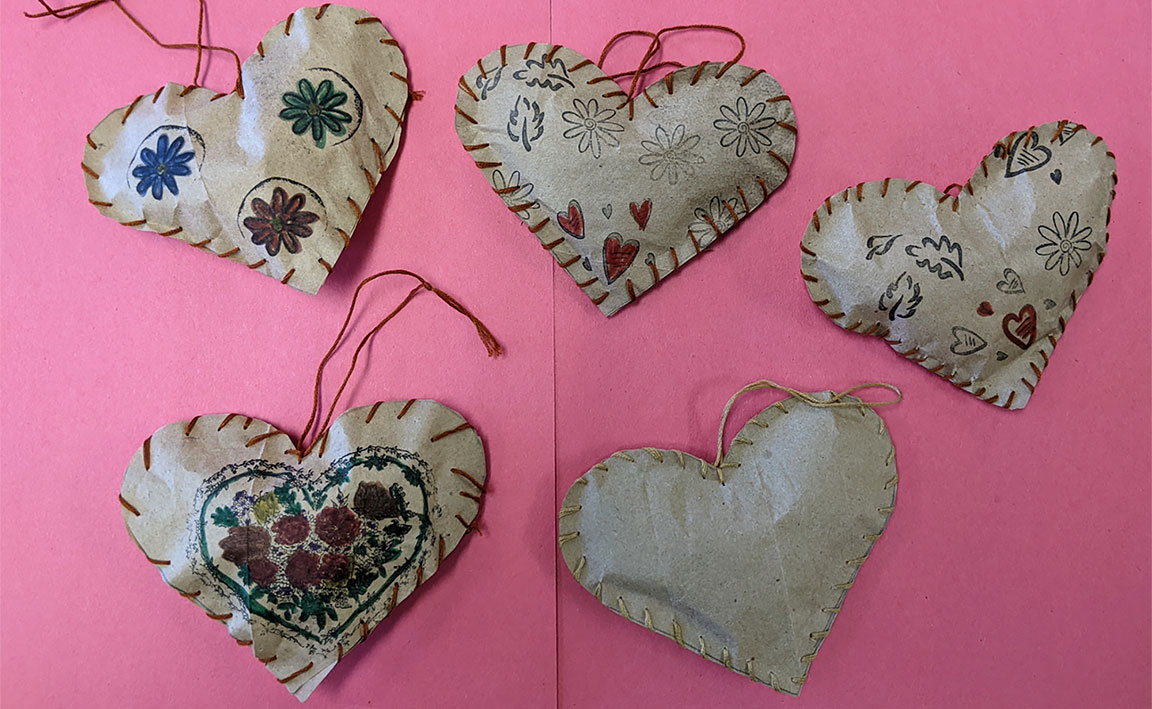
Maine Extension Homemakers Newsletter, Spring 2022
Table of Contents
- Presidential Ponderings from Bea LaPlante
- Around the State
- Enjoy Some Summer Time Fun at the MEHC State Spring Meeting!
- Officers Needed
- University of Maine COVID 19 Updates
- Remember This?
- Mark Your Calendar!
- Recipes to Commemorate Tax Day: April 15
- Meet Your County Advisors
- What’s Going On Around the Yard?
- What We’re Watching: Browntail Moth
- Craft Corner: What We’re Making
Presidential Ponderings from Bea LaPlante

We had our first advisory board meeting on 9 March 2022 in Bangor and it
felt like getting back to normal. We are having a Spring meeting in May
and you will be getting a Registration Package in April.
We are still looking for someone who would like to run for
President/Vice President/Secretary. We have someone who will be running
for Treasurer. We need these positions filled if we want to keep
Extension Homemakers alive.
Look forward to seeing you in May,
Bea
Around the State

Androscoggin County
A brand new Extension Homemaker club in Androscoggin County, Living Innovations, had their first meeting. Advisor Cathy Bartlett Gray facilitated a stuffed heart craft project where the group used some recycled materials to create a sharable sentiment of love. This group plans to meet monthly and have guest facilitators from surrounding counties lead projects.
Aroostook County
Some members of the Caribou Homemakers have participated in online cook-along webinars hosted by the Aroostook Agency on Aging, University of Maine Cooperative Extension, Northern Maine Community College and Northern Light Health. Cooking with Ancient Grains was the most recent cook-along, and featured Kamut cooked in a creamy sauce with wilted greens and chicken.
Franklin County
Franklin County has completed their annual winter tissue drive with a total of 344 boxes of tissues received. The tissues were donated to schools in Franklin County and the teachers have been most appreciative!
Hancock County
The Hancock County Scholarship Committee met to discuss the annual scholarship recipient from the graduating class of 2022. Some of the groups have joined forces and merged.
Oxford County
Roxbury Swift River Valley Extension Homemakers were recognized by the Town of Roxbury by having the 2019 Town Report dedicated to them. Some clubs are having a hard time to hold meetings and there is talk about disbanding altogether.
Somerset County
Extension Homemakers have a few new faces in the Extension Office, including Emily Collins, who will be the support staff for the Extension Homemakers. The advisory board met in February and had a presentation on The History of Tea by advisor Lisa Fishman.
 Enjoy Some Summer Time Fun at the MEHC State Spring Meeting!
Enjoy Some Summer Time Fun at the MEHC State Spring Meeting!
At long last, the Maine Extension Homemakers Council will hold a Spring Meeting on May 21, 2022, in Bangor. Registration packets have already been sent to all County Club Presidents and are also available at each County Extension office by asking the support staff for a copy. This meeting will be the first state-wide gathering of the Extension Homemakers in more than two years. We encourage you to come and enjoy the day and to reconnect with friends. The theme is “Summertime Fun” so come in your comfortable summertime clothes!
Officers Needed
President: Bea LaPlante’s term will end at the end of 2022.
Vice President: Position is currently vacant.
Secretary: Bonnie Weatherhead’s term will end at the end of 2022.
Treasurer: Judy Mann’s term will end at the end of 2022.
Members of the nominating committee are Ellen Kavin (Aroostook), Pam Dupont (Hancock), Amy Palmer and Lois King (Franklin), Reni Davis (Somerset), Sylvia Simmons (Oxford). Please reach out to any member of the nominating committee if you are interested in running for a state office.
University of Maine COVID 19 Updates
After more than two years of mandates governing UMaine Extension County Offices and Extension programming, we are finally able to allow groups to meet, to have food at meetings, and to go mask-free. The decision by anyone to continue to wear a mask will be respected.
Remember This?
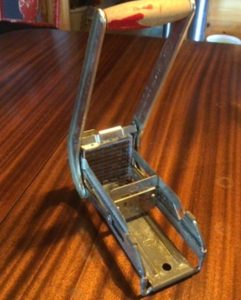 Last issue was a French fry cutter and Lois King from Franklin County was quick to let us know she knew just what it was.
Last issue was a French fry cutter and Lois King from Franklin County was quick to let us know she knew just what it was.
In this issue, we want to know how many of you know what historical event happened on May 11, 1934? A hint: John Steinbeck wrote about it in his novel “The Grapes of Wrath.”
Mark Your Calendar!
April is National Brunch Month, National Afternoon Tea Month, National Month of Hope, and National Volunteer Month! April 7 is National No-Housework Day, the 13th is National Scrabble Day and the 22nd is Earth Day.
May brings National ALS Awareness Month, Mental Health Awareness Month, and National Salad, Strawberry, and Salsa Month. It also brings Mother’s Day and National Coconut Cream Pie Day on May 8. Coincidence? We think not. May 21 is the MEHC Spring Meeting in Bangor.
June is National Dairy Month and National Pollinators Month. June 6 commemorates D-Day, June 19 commemorates Juneteenth, and June 26 and 27 are National Chocolate Pudding and National Coconut days, respectively. Another fascinating coincidence!
Recipes to Commemorate Tax Day: April 15
Million Dollar Dip
Recipe tested by Lisa Fishman. Makes about 3 cups of dip.
Ingredients
- 1 ½ cups real mayonnaise, not lite
- 1 cup cheddar cheese, grated
- 4 green onions, finely chopped
- ½ cup cooked bacon, finely chopped
- ½ cup slivered almonds
- 1 teaspoon minced garlic
Instructions
In large bowl, combine all ingredients and thoroughly mix with spatula. Cover and refrigerate until ready to serve. Refrigerate leftovers and use within 3 days
Poor Man’s Soup
Adapted and used with permission from “All She Cooks.” Yields 6-8 servings of soup.
Ingredients
- 1 to 1 1/2 lbs ground beef or ground turkey
- 1 can 10 oz diced tomatoes with green chilies
- 16 oz. package frozen mixed vegetables
- 6-8 potatoes, diced
- 1 small onion diced
- 6 beef bouillon cubes
- 8 cups water
- 4 ounce can of tomato paste
- salt and pepper to taste
Instructions
Brown meat in a large skillet. Drain grease. Add remaining ingredients and heat until boiling. Reduce heat to simmer for 30-60 minutes, or until potatoes are tender. Season with salt and pepper to taste. Serve with crackers or cornbread.
This can also be prepared in a slow cooker. Simply brown the beef or turkey in a skillet on the stove, transfer drained meat to the slow cooker, then add remaining ingredients and cook on low setting for 6-8 hours.
In Honor of National Dairy Month: Date-licious Chocolate Raspberry Smoothie
Adapted with permission from Dairy Management Inc.
Ingredients
- 1 cup low-fat chocolate milk
- 1/2 cup frozen, unsweetened raspberries
- 3 pitted dates
- 1 tablespoon unsweetened cocoa powder
Instructions
In a blender container, combine all ingredients. Cover and blend until smooth. Pour into a tall glass and serve.
Meet Your County Advisors
Angela Martin, Statewide support
angela.martin@maine.edu
Cathy Gray, York, Cumberland, and Oxford
cathy.gray@maine.edu
Lisa Fishman, Aroostook, Franklin, Somerset and Hancock
lisa.fishman@maine.edu
In this issue, your Homemaker Advisory Team — Angela, Cathy, and Lisa — shares what their favorite pizza toppings are.
Someone likes a good old cheese pizza, another one likes pepperoni and hamburger, and one likes a Hawaiian pizza, loaded with ham and pineapple. Can you guess who likes what? Check the end of the newsletter to find out who belongs to which pizza topping.
What’s Going On Around the Yard?
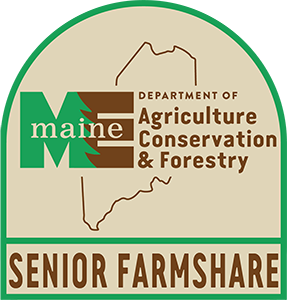 It’s time to sign up for Senior Farm Shares! Participating seniors receive a share (worth $50) of first-quality, fresh, local produce at no cost from a Maine Senior FarmShare Program authorized farm during the growing season.
It’s time to sign up for Senior Farm Shares! Participating seniors receive a share (worth $50) of first-quality, fresh, local produce at no cost from a Maine Senior FarmShare Program authorized farm during the growing season.
How and When to Sign Up
- Choose a farm and sign up
- Sign-up begins each year in April. The number of available senior shares is limited and on a first come first serve basis.
- You may only sign up with one farm per year.
- Once the farm you chose has produce available you can begin shopping!
- Find Authorized Farms
- Contact the Area Agency on Aging by calling 1-877-353-3771; TTY users call Maine Relay 711.
- Call the Maine Senior FarmShare Program at (207) 446-5550.
- Email SeniorFarmShare.AGR@maine.gov.
- Full List of Authorized Farms by County (all links are PDFs):
- Things to consider when choosing a farm:
- Does the farm grow fruits and vegetables that you like?
- Is the farmer close to you and easy for you to get to?
- Does the farmer deliver, or do you pick up?
- Can you shop for your produce or does the farmer prepackage produce for you?
- REMINDER: If you participated in the program during a prior year, you are NOT automatically signed up for the next year. You must contact the farm and sign up every year.
- You are not officially signed up until you complete and sign a Senior FarmShare Agreement Form with an authorized farm.
- It is the senior’s responsibility to contact an authorized farm to sign up for participation in the program.
The total number of seniors who qualify for Maine Senior FarmShare Program each year significantly outnumbers the number of FarmShares available in the program. Seniors will be put on a waiting list if the farm they have chosen has filled all their Senior FarmShares.
Eligibility Guidelines
Please understand that meeting the eligibility requirements does not guarantee you a Senior FarmShare. To participate in the Maine Senior FarmShare Program you must:
- Be a Maine resident
- Be 60 years old or older (55 years old or older for Native Americans)
- Meet the 2021 Income Guidelines:
- Income eligibility guidelines are effective July 1, 2021 to June 30, 2022.
- Maximum of $23,828/per year for a one-person household; or
- Maximum of $32,227/per year for a two-person household
Eligibility guidelines are updated annually. If you need assistance determining your eligibility you can:
- Call the Area Agency on Aging at 1-877-353-3771; TTY users call Maine Relay 711.
- Call the Maine Senior FarmShare Program at (207) 446-5550.
- Email SeniorFarmShare.AGR@maine.gov

What We’re Watching: Browntail Moth
By the Maine Department of Agriculture, Conservation and Forestry
Browntail Moth (BTM) populations in Maine have been in an outbreak phase since 2015 and the pest cannot be eradicated. Most areas of Maine, especially settled areas with significant host tree populations such as oak, apple, crabapple, pear, birch, cherry, or other hardwoods, are at risk of infestation by the caterpillars. While long-lasting tree defoliation and branch dieback are major concerns, BTM’s microscopic, toxic hairs can cause trouble breathing and skin irritation similar to poison ivy from a few hours up to several weeks.
The Maine Forest Service (MFS) Forest Health and Monitoring Division coordinates within state government, local communities, and directly with citizens to respond to this issue. Winter is the best time to clip and destroy BTM winter webs within reach or hire licensed arborists or pesticide applicators to reduce out-of-reach populations. Comprehensive BTM information and tools compiled by MFS, Board of Pesticides Control, Maine Center for Disease Control, the University of Maine, and other partners including research, infestation tracking, FAQs, and educational resources for communities, municipalities, businesses, and healthcare providers, are available on maine.gov/dacf/knockoutbtm.
Follow the Four Rs to “Knock Out BTM” In Our Communities and Reduce the Itch!
Recognize: Learn how to tell if the trees where you live, work, and play have BTM. Their winter webs can look like single leaves hanging onto twigs or fist-sized clumps of leaves tied together tightly with silk. Knowing where the nests are in your yard or town can help inform your management decisions. Learn more by participating in the BTM Awareness Month events included below.
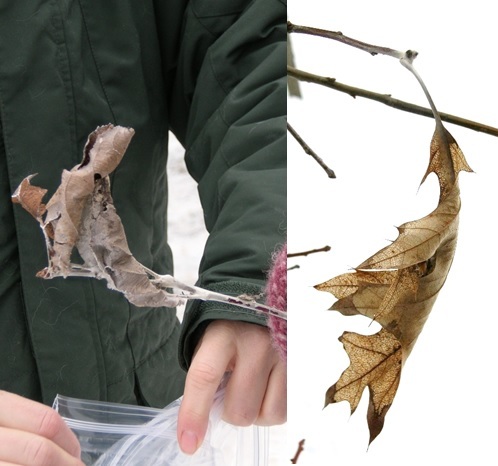
Remove: With permission, use hand snips or extendable pole pruners to remove webs within reach from the ground and away from hazards such as powerlines. Protect your eyes and skin from hairs that might be present from past caterpillar activity. After removal, destroy webs by burning or soaking in soapy water for several days, then dispose of the nests in the trash.
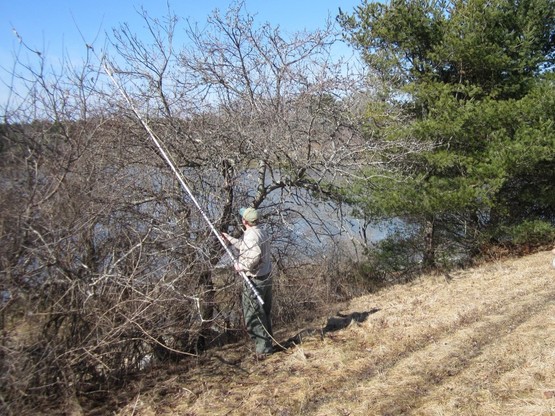
Recruit: Hire professional help to treat webs out of reach or near hazards on the property you own or manage. Line up help during winter. Licensed Professional Arborists can remove BTM webs in larger trees and shrubs in the winter. In trees where the caterpillars’ hairs cause a nuisance and where it is not practical to remove the webs, Licensed Pesticide Applicators may be able to use insecticides during the growing season to manage BTM.
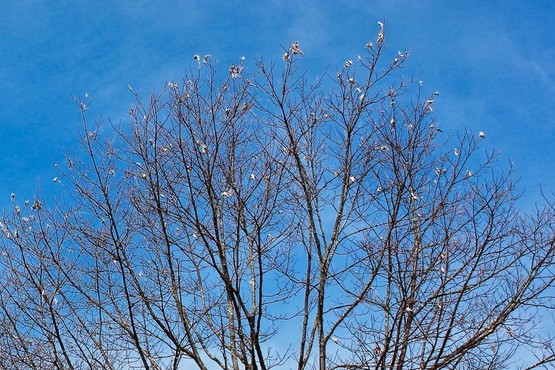
Reach Out: If you find BTM in your neighborhood, let your neighbors and town officials know. The more neighbors, businesses, and others get together to respond to the problem, the better the results.
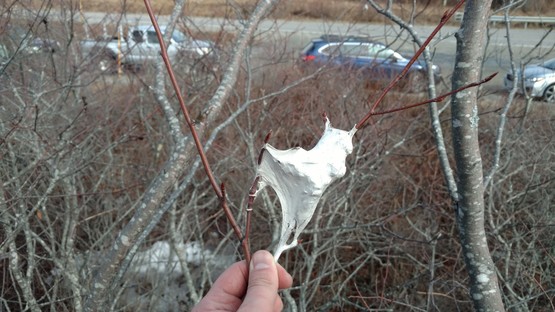
Encounters with hairs from BTM caterpillars can cause mild to severe rashes and respiratory issues. Some people say they experience itching with fewer than ten webs per tree or shrub; others say they have no symptoms from heavier infestations around their yards.
Everyone is invited to participate in the following BTM Awareness Month events or set up community events. Use #KnockOutBTM on social media to share your efforts. Some ideas for activities include mapping infestations on the town and public properties, hosting public service web-clipping events, creating contests for the most webs clipped or other community, and knowledge building activities.
For more information:
Contact 211 Maine for answers to BTM FAQs:
- Call 211 or 1-877-463-6207
- Text your ZIP code to 898-211
Or visit the MFS website. While you are there, sign up for the BTM News Bulletin.

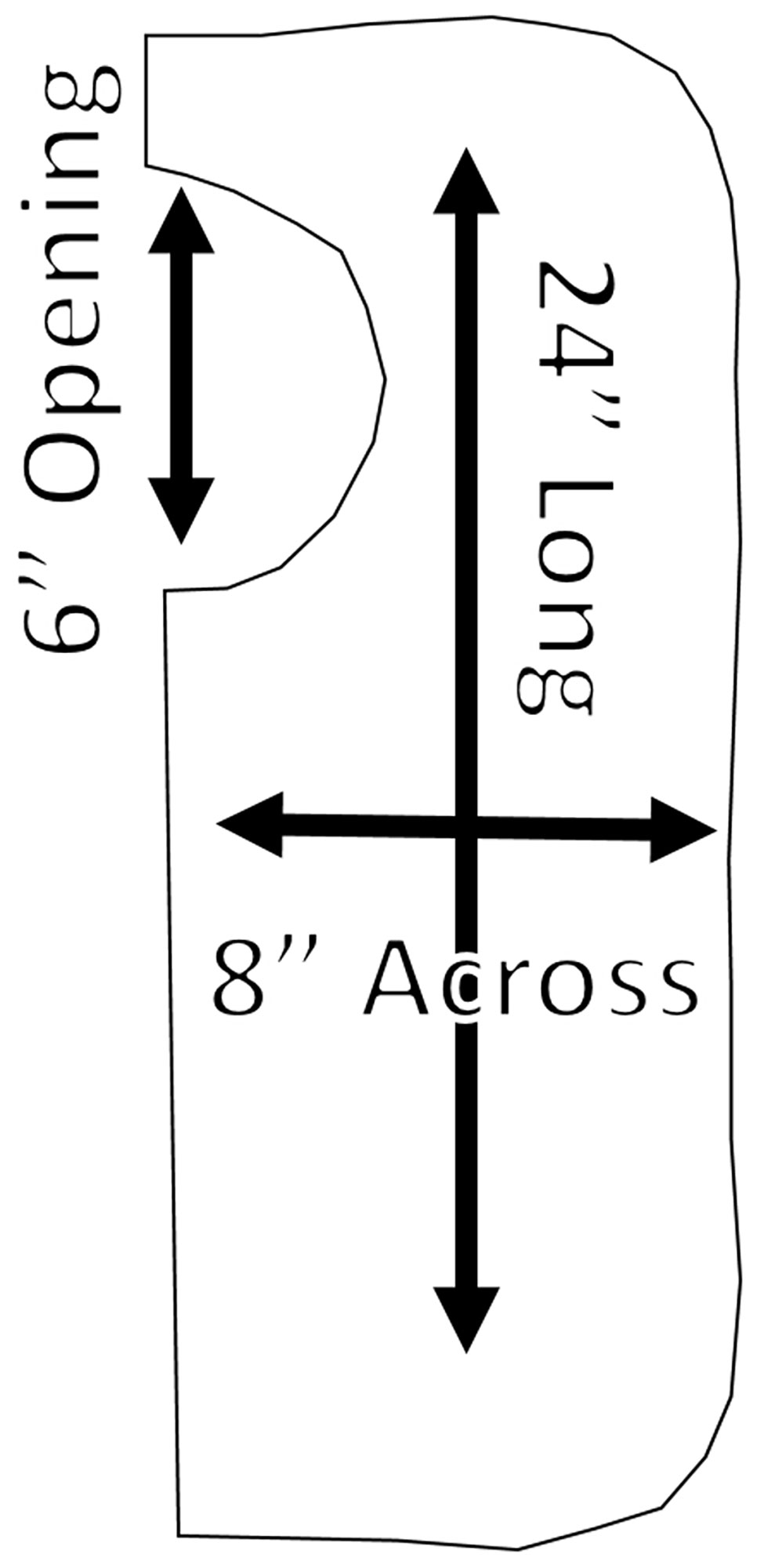 Craft Corner: What We’re Making
Craft Corner: What We’re Making
Dignity Bibs or Adult Cover-Ups are popular because they often are made from articles of clothing someone is accustomed to wearing, such as a favorite flannel shirt or blouse. They are super easy to make and are greatly appreciated by Veteran’s Homes, long-term care facilities, rehabilitation centers, and individuals themselves. The diagram for the pattern is shown here.
Directions for Adult Cover-Up
- Place right sides of fabric together and pin.
- The left side should be place on the fold.
- Stitch ¼” seam around the whole cover-up, leaving a 2” hole for turning.
- Clip all curves and corners.
- Turn right side out.
- Iron.
- Top stitch close to the edge, making sure to catch the opening.
- Stitch a 2” piece of Velcro at the closure of the neck.
Drawing by Neil Thompson, Forestry Professor at UMFK.
Instructions by the Franklin County Extension Homemakers.
Pizza Toppings Revealed!
Angela is partial to cheese pizza, Cathy is the Hawaiian pizza, and Lisa is the pepperoni and hamburger pizza.
Information in this publication is provided purely for educational purposes. No responsibility is assumed for any problems associated with the use of products or services mentioned. No endorsement of products or companies is intended, nor is criticism of unnamed products or companies implied.
© 2022
Call 800.287.0274 (in Maine), or 207.581.3188, for information on publications and program offerings from University of Maine Cooperative Extension, or visit extension.umaine.edu.
The University of Maine is an EEO/AA employer, and does not discriminate on the grounds of race, color, religion, sex, sexual orientation, transgender status, gender expression, national origin, citizenship status, age, disability, genetic information or veteran’s status in employment, education, and all other programs and activities. The following person has been designated to handle inquiries regarding non-discrimination policies: Director of Equal Opportunity, 101 North Stevens Hall, University of Maine, Orono, ME 04469-5754, 207.581.1226, TTY 711 (Maine Relay System).
